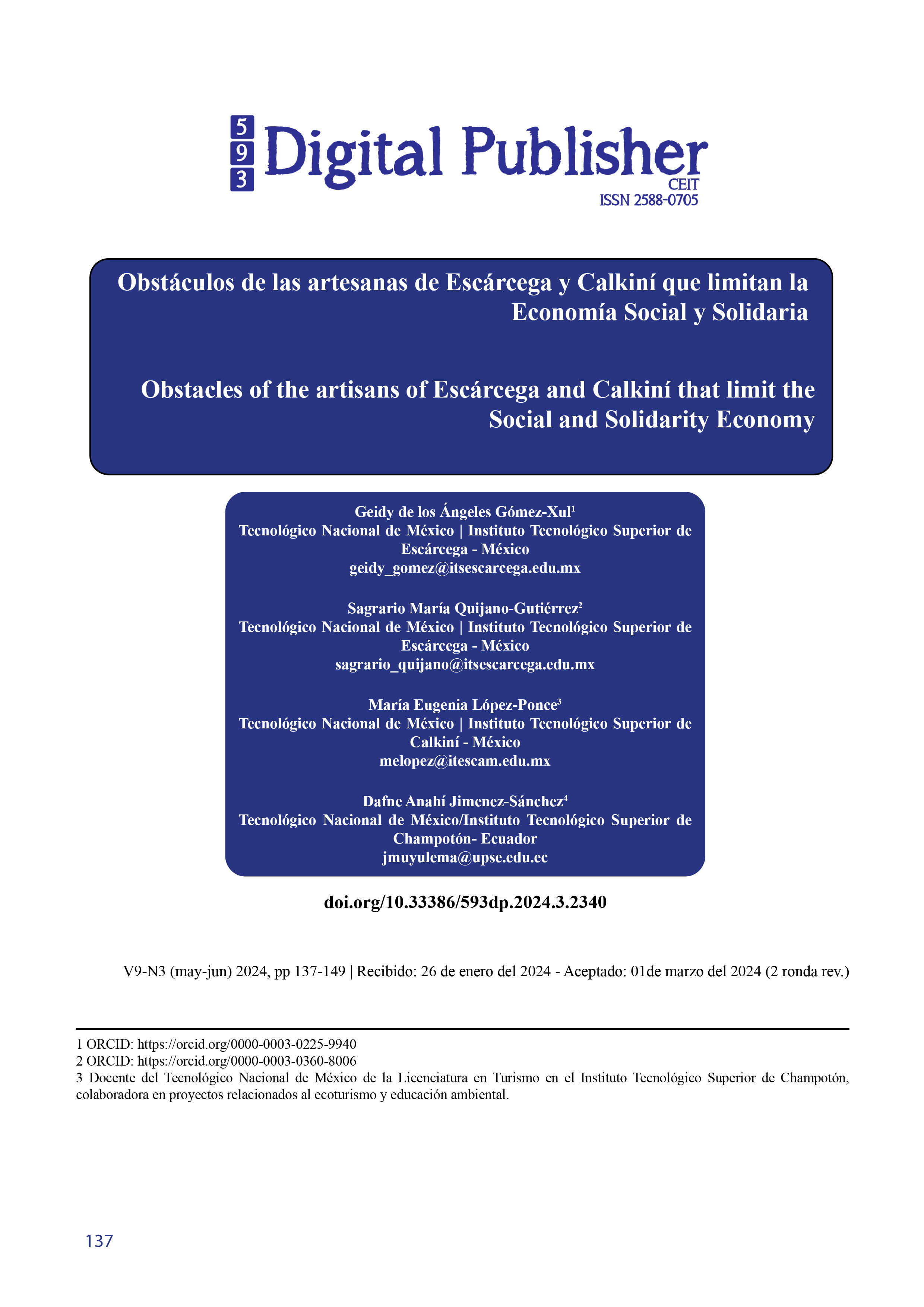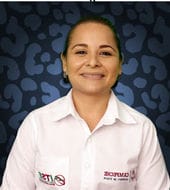Obstáculos de las artesanas de Escárcega y Calkiní que limitan la Economía Social y Solidaria
Contenido principal del artículo
Resumen
El sector artesanal representa una parte importante de la cultura, la identidad y la economía de cualquier localidad. La economía solidaria permite a las mujeres no sólo su inclusión para generar sus propios ingresos, también permite la integración de grupos para establecer alianzas estratégicas logrando su independencia financiera y poder tomar sus propias decisiones, beneficiándose ellas, pero a la vez a la comunidad en al ámbito económico, social y ambiental. El propósito de este trabajo es identificar los obstáculos que las mujeres artesanas presentan actualmente y que han limitado la realización de prácticas de Economía Social y Solidaria (ESS); de las localidades de Escárcega y Calkiní del Estado de Campeche. La metodología tiene un enfoque descriptivo cualitativo, el tipo de muestra es por conveniencia, se tuvo acceso con 18 artesanas mayores de edad pertenecientes a las localidades de Escárcega y Calkiní del estado de Campeche, la recolección de los datos se realizó a través de la aplicación de un cuestionario con la técnica de entrevistas. Como parte de los resultados se identificaron 15 obstáculos de los cuáles los que mayor se presentan son: el tiempo, recursos económicos limitados, identidad de género, limitado apoyo del gobierno, y desconocimiento de temas administrativos mismos que están relacionados con las dimensiones humana, social, económica, tecnológica, política, ambiental de la economía social y solidaria. El conocer aquello que impide a la artesana tener un crecimiento y desarrollo empresarial con el modelo de la ESS permitirá generar acciones para fortalecer las prácticas en sus negocios.
Descargas
Detalles del artículo

Esta obra está bajo una licencia internacional Creative Commons Atribución-NoComercial-CompartirIgual 4.0.
1. Derechos de autor
Las obras que se publican en 593 Digital Publisher CEIT están sujetas a los siguientes términos:
1.1. 593 Digital Publisher CEIT, conserva los derechos patrimoniales (copyright) de las obras publicadas, favorece y permite la reutilización de las mismas bajo la licencia Licencia Creative Commons 4.0 de Reconocimiento-NoComercial-CompartirIgual 4.0, por lo cual se pueden copiar, usar, difundir, transmitir y exponer públicamente, siempre que:
1.1.a. Se cite la autoría y fuente original de su publicación (revista, editorial, URL).
1.1.b. No se usen para fines comerciales u onerosos.
1.1.c. Se mencione la existencia y especificaciones de esta licencia de uso.
Citas
Aguilar, Á., Cruz, I., Martínez, J., y Santiago, N. (2019). Los actores de la economía social y solidaria en el medio rural: diálogos, desafíos y políticas públicas. INAES.
Atienza, M. (2017). El enfoque de género en la economía social y solidaria: aportes de la economía feminista. Economistas sin fronteras (25), 1-4.
Blanco, B., Fernández, D., y Piñeiro, D. (2020). Desarrollo local y economía social y solidaria; desde la historia hasta el municipio los Palacios. Dilemas Contemporáneos: Educación, Política y Valores.(2), 1-18.
Borzaga, C., Salvatori, G., y Bodini, R. (2018). La economía social y solidaria y el futuro del trabajo. OIT. https://doi.org/ISBN 978-92-2-031167-7
Caicedo, G. A. (2020). La asociación de producción textil arte y superación asoproar: surgimiento y aportes a la economía solidaria. Trabajo de titulación, previo a la obtención del título de economista. Universidad de Guayaquil, Ecuador.
Camacho, G., Gómez, L., y Ruiz, M. (2022). Perspectivas de la economia social-solidaria en México y oportunidades para las cooperativas del impulso empresarial. INAES.
Ferro, D. (2015). Identidad, cultura e innovación en las artesanías: un camino para el desarrollo sustentable y el buen vivir. Estudios de la Gestión (1), 95-116.
Fonart. (2015). Gobierno de México. Manual de diferenciación entre artesanía y manualidad.
Fonteneau, B., Neamtan, N., Wanyama, F., Pereira, L., y de Poorter, M. (2010). Economía social y solidaria: construyendo un entendimiento común. Turín, Italia: Centro internacional de formación de la OIT.
Gobierno de México. (04 de mayo de 2021). Instituto nacional de economía solidaria. https://www.gob.mx/inaes/articulos/a-que-nos-referimos-cuando-hablamos-de- economia-social?idiom=es
Chiquearte. (2021). ¿Qué dificultades enfrentan los artesanos? – Chiquearte. https://chiquearte.com/que-dificultades-enfrentan-los-artesanos/
FAO. (2023). Roles, desafíos y oportunidades para las mujeres artesanas algodoneras es tema de conversatorio regional | Programa de Cooperación Internacional Brasil-FAO | Organización de las Naciones Unidas para la Alimentación y la Agricultura. https://www.fao.org/in-action/programa-brasil-fao/noticias/ver/es/c/1654992/
Novillo, E. (2018). La Economía Social y Solidaria: una economía para las personas - economiasolidaria.org. https://www.economiasolidaria.org/recursos/biblioteca-la-economia-social-y-solidaria-una-economia-para-las-personas/
Pérez Mendiguren, J. C. (2015). Sobre el concepto de economía social y solidaria: Aproximaciones desde Europa y América Latina. Revista de Economía Mundial, 123–144. https://dhls.hegoa.ehu.eus/uploads/resources/6369/resource_files/Concepto_Economia_Social_y_Solidaria.pdf?v=63741890406
Saligan Rojas, I., Salinas García, V., & DEl Carpio Ovando, P. (2017). Dificultades en torno a la producción artesanal. Jóvenes En La Ciencia. Revista de Divulgación Científica., 3. http://www.repositorio.ugto.mx/bitstream/20.500.12059/4517/1/Dificultades en torno a la producción artesanal.pdf
Sampieri, H., Fernández Collado, R., & Baptista Lucio, C. (2014). Metodología de la investigación (Mc Graw Hiil (ed.)).





